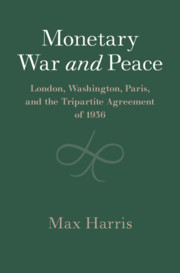Book contents
- Monetary War and Peace
- Studies in Macroeconomic History
- Monetary War and Peace
- Copyright page
- Contents
- Figures
- Tables
- Acknowledgments
- Abbreviations
- Introduction
- 1 A Classical Prelude, 1880–1914
- 2 Britain’s Biggest Blunder, 1914–1931
- 3 Hostilities Commence, 1931–1933
- 4 Washington Declares War, 1933–1935
- 5 Negotiating Peace, 1935–1936
- 6 A New Order, 1936–1939
- 7 Gold and Dollars, 1936–1937
- 8 Keeping France Afloat, 1937–1938
- 9 Battle for Sterling, 1938–1939
- 10 From Bretton Woods to Today
- Conclusion
- Book part
- References
- Index
- Series page
3 - Hostilities Commence, 1931–1933
Published online by Cambridge University Press: 24 February 2021
- Monetary War and Peace
- Studies in Macroeconomic History
- Monetary War and Peace
- Copyright page
- Contents
- Figures
- Tables
- Acknowledgments
- Abbreviations
- Introduction
- 1 A Classical Prelude, 1880–1914
- 2 Britain’s Biggest Blunder, 1914–1931
- 3 Hostilities Commence, 1931–1933
- 4 Washington Declares War, 1933–1935
- 5 Negotiating Peace, 1935–1936
- 6 A New Order, 1936–1939
- 7 Gold and Dollars, 1936–1937
- 8 Keeping France Afloat, 1937–1938
- 9 Battle for Sterling, 1938–1939
- 10 From Bretton Woods to Today
- Conclusion
- Book part
- References
- Index
- Series page
Summary
This chapter traces the evolution of the international monetary system and the management of sterling from Britain's suspension of convertibility in September 1931 to the eve of Franklin Roosevelt's inauguration in March 1933. To influence the pound's value now that it was no longer tied to gold, Britain created the Exchange Equalisation Account, an innovation of lasting consequence that led to accusations of currency manipulation. All the while, the world splintered into monetary blocs: many countries followed sterling's lead, some recommitted to gold, and others found refuge in exchange controls. This fragmentation, coupled with sterling's depreciation, the secrecy with which London employed the fund to manage the pound, and the increasing tendency of all to view policy in zero-sum terms, drowned the powers in bad blood and brought monetary cooperation to a halt.
Keywords
- Type
- Chapter
- Information
- Monetary War and PeaceLondon, Washington, Paris, and the Tripartite Agreement of 1936, pp. 51 - 75Publisher: Cambridge University PressPrint publication year: 2021

